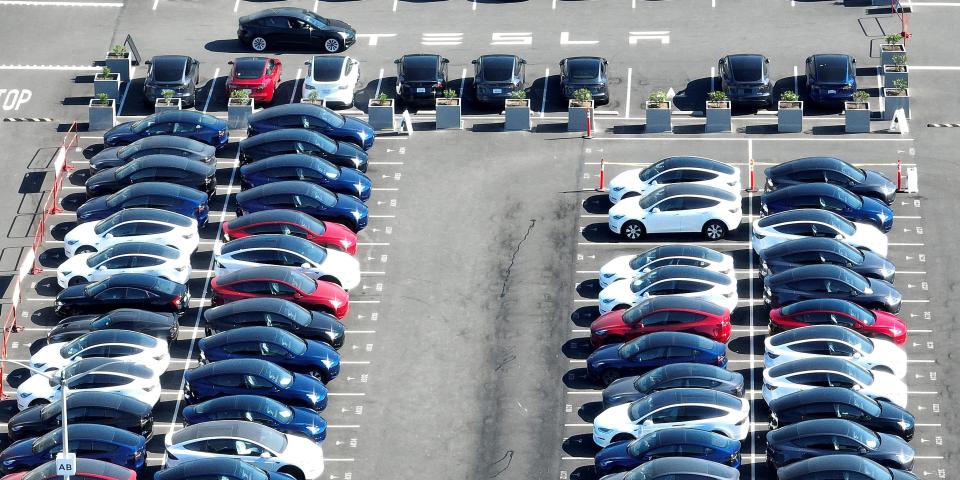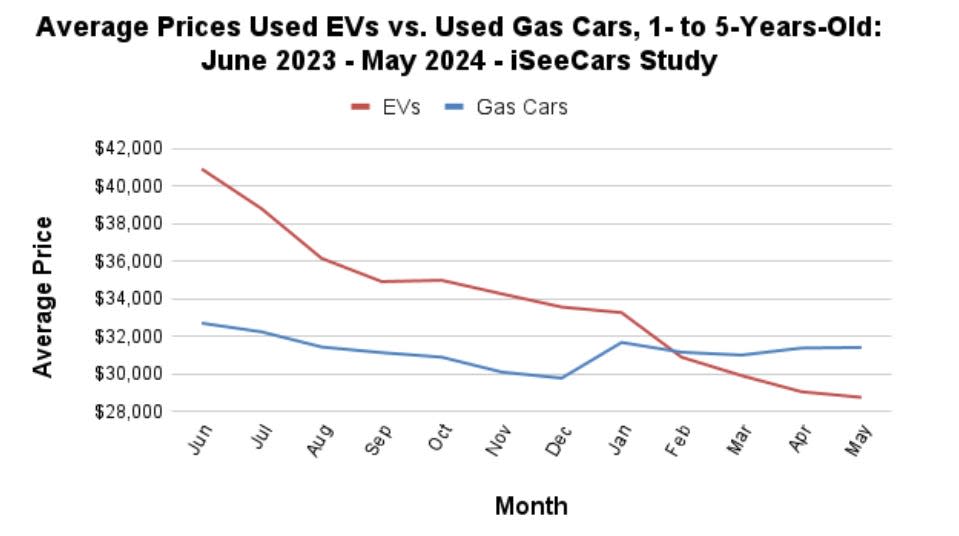Used-EV prices are crashing as buyers shift back towards hybrid vehicles

Used EVs now cost less than their gas counterparts, with the gap ballooning since February.
Only 18% of consumers said they're likely to buy an EV, a multi-year low.
The demand pullback has "wreaked havoc" on production, a new report said.
Consumers are pumping the brakes on electric-vehicle demand as technological limitations erase the premium buyers used to be willing to pay.
For the first time, used EVs are less expensive than their traditional gas counterparts. Not only are prices lower, they're also plummeting at a much steeper clip, a recent report from iSeeCars said.
According to the study, the average used EV fell $265 below the typical gas car in February, marking the trend's start. As of May, that difference has ballooned to $2,657.

"It's clear used car shoppers will no longer pay a premium for electric vehicles and, in fact, consider electric powertrains a detractor, making them less desirable — and less valuable — than traditional models," executive analyst Karl Brauer said in the report.
By another measure, the average price of an EV fell 29.5% between May 2023 and 2024, compared to a 6.1% slide for combustion engine cars.
An example provided by the study compared the BMW 3 Series with a Tesla Model 3: while the Tesla's price was $2,635 higher in June last year, it stood $4,806 below the BMW in May 2024.
That slide is easy to explain for the broader auto industry, where improved post-pandemic supply chains have led to declining prices.
But that's just part of the story for EVs, a market battered by an extra slew of niche headwinds.
In a June AAA survey, only 18% of consumers indicated that they would be likely to purchase an EV — a multi-year low. Leading hesitations included the higher costs, limited access to charging stations, and worries about how far an EV can drive without charging.
Instead, consumer interest leaned more towards hybrid models, which offer both a gas and electric motor. In fact, one-third of respondents indicated they would purchase this type of vehicle.
For industry players that wagered on a coming wave of EV consumption, faltering demand has not done any favors for production, Bank of America said this month.
"The unprecedented EV head-fake over the last three years has wreaked havoc on product planning. The prior acceleration in EV launches is doing a U-turn in favor of extending [internal combustion engine] programs and new hybrids," analysts wrote. "However, while there is a lot of talk about hybrids, there isn't much action."
Vanishing EV consumers have tugged on the sector in other ways. For instance, below-estimate deliveries have dented the performance of Tesla and Rivian stocks, and these companies have been among many to enact workforce cuts due to strained demand.
Elsewhere, Fisker has filed for bankruptcy, citing market issues in a statement this week. And earlier this year, the rental firm Hertz sold 20,000 of its Tesla rentals. Among a handful of reasons, requests for the vehicles were not as high as expected.
While the iSeeCars report does not, in fact, yet see where EV prices will bottom out, most analysts are not too concerned about a complete rejection of the market. If consumers don't lead an industry embrace, US emissions regulation will ensure continued production, just at a tempered pace, Bank of America said.
"Despite the apparent slowdown in the powertrain transition (EVs and Hybrids), there is still a wave, albeit smaller than before, of alternative powertrain launches from almost all automakers," the note said.
Examples includes Ford products, and GM's Cadillac as a "spearhead for EVs," it added.
Read the original article on Business Insider

 Yahoo Autos
Yahoo Autos 